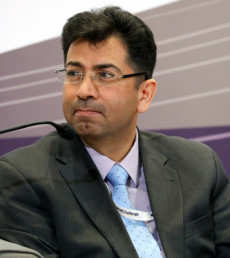
This award has put greater responsibilities on my shoulders. I vow to do my utmost to serve humanity

This award has put greater responsibilities on my shoulders. I vow to do my utmost to serve humanity
A man from Shingal wins a $1 million prize for carrying out humanitarian work; an Ezidi who becomes a glimpse of hope amid the devastating legacy of war.
“I want to serve humanity day and night; they all deserve to be served,” this belief entitled him to win the prestigious Aurora 2019 prize in the Armenian capital Yerevan last week.
Mirza Hassan Ali, known as Mirza Dinnayi was born in Shingal’s Khanasur sub-district in 1973. After graduating from high school in his hometown and got 97 in the ministerial exams which enrolled him in the medical school of Mosul University.
Mirza Dinnayi, 46, devoted much of his life for humanitarian work and standing against the injustices practiced by the former Ba’ath regime in Iraq. Fearing persecution, he left the medical school in Mosul and undertook the gruesome task of saving victims of terror. His toughest mission was when the Islamic State (IS) group attacked the Ezidi community in Shingal.
A year after he enrolled to Mosul’s medical school he joined a group which protested Iraq’s political regime. Concerned for his safety, he was forced to abandon the university and returned to Shingal.
In 1995, he sought refuge in Germany where he completed his medical degree.
After the fall of the Ba’ath regime, Mirza Dinnayi returned to Iraq and became advisor to the then President Jalal Talabani for minority affairs.
Dinnayi’s first mission
In 2007, deadly bombings struck Siba Sheikh Khidir and Grr Ozer in the Ezidi district of Shingal west of Mosul which left dozens of casualties. Al-Qaida had claimed responsibility for the attacks.
Mirza Dinnayi was in Germany at the time. “Following the attacks, I immediately decided to return. I launched a fund raising campaign for the victims of the bombings.”
He also urged the government of Germany to help treat the wounded of the attack.
“As a result, two German hospitals said they would treat the children for free if they could be brought to Germany. I undertook the task of transporting a number of children to German hospitals; three months later we brought back to the Kurdistan Region in good health condition.”
It was a promising start for Mirza Dinnayi, and encouraged him to do more. Eventually, he and his German friends decided to launch a new organization that would fly victims of all ethnicities and religions from Iraq to Germany for treatment. That is how Luftbrücke Irak, or Air Bridge Iraq, came to be.
Regarding the initiative, Dinnayi says, “the Siba Sheikh Khidir and Grr Ozer atrocities motivated me to carry out the project.”
During 12 years, Air Bridge Iraq provided treatment for nearly 150 wounded children from different Iraqi provinces.
Mirza Dinnayi was shaken to the core when he heard that the Islamic State (IS) group had overrun Shingal exposing the Ezidi community to mass slaughter, kidnapping and displacement.
That proved to be a real challenge to Dinnayi and his organization. When IS swept through Shingal on August 3, 2014 targeting the Ezidi population, Dinnayi, who was in Germany back then, returned to the Kurdistan Region.
“We worked in collaboration with an Iraqi aviation team to help carry Ezidis trapped on Mount Shingal to safety,” he said.
Dinnayi was injured when the helicopter he was in crashed in the mountain. With the serious injuries he sustained, he was now the one to return to Germany for treatment.
Despite being injured, he didn’t rest. Still in a wheelchair, Dinnayi attended a conference on human rights in Geneva where he delivered the suffering of the Ezidi community to the world.
“I asked the international community to recognize the Shingal catastrophe as genocide. Although my injuries were yet to heal, I returned to the Kurdistan Region to help the Ezidis.”
Dinnayi started lobbying to gather more help for his community. He often delivered speeches in the German parliament to call for support.
“I was seeking speedy action to help free Ezidi women and girls abducted by IS.”
According to statistics by the Kurdistan Regional Government, back then, more than six thousand Ezidi women and children were in IS captivity. Their number is now estimated to be 2,900 whose fate remains unknown.
“The lobbies resulted in Germany hosting as many as 1,100 Ezidi women and girls. We work to ensure that more victims of IS brutality are brought to Germany.
An award for the sake of humanity
Mirza Dinnay’s dedication earned him the Aurora 2019 prize for Awakening Humanity.
Dinnayi, who is the fourth recipient of the prestigious award said he will donate the $1 million prize to three organizations which provide help to the poverty-stricken and agonized families in volatile regions.
The Aurora Prize is granted by the Aurora Humanitarian Initiative on behalf of the survivors of the Armenian Genocide and in gratitude to their saviors.
“This award has put greater responsibilities on my shoulders. I vow to do my utmost to serve humanity,” Dinnayi said.